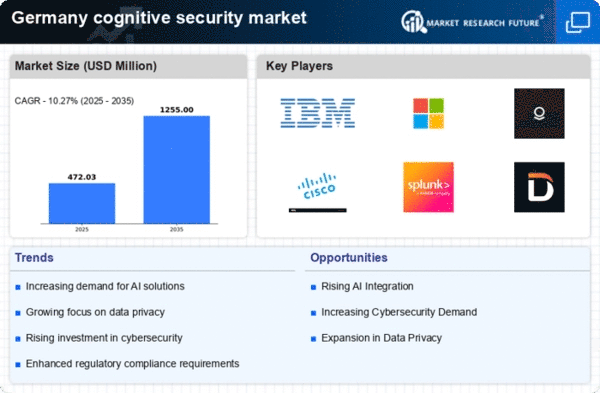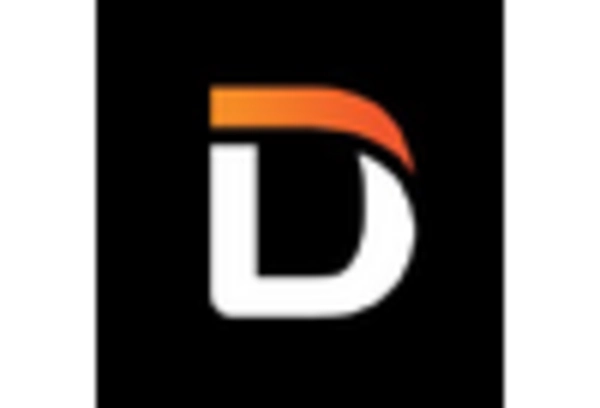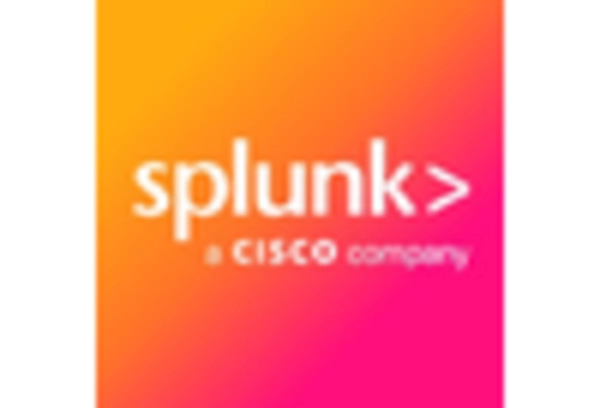Rising Cyber Threats
The cognitive security market in Germany is experiencing growth due to the increasing frequency and sophistication of cyber threats. Organizations are investing heavily in cognitive security solutions to protect sensitive data and maintain operational integrity. In 2025, it is estimated that cybercrime could cost the global economy over $10 trillion annually, prompting German companies to adopt advanced security measures. The cognitive security market is thus positioned to benefit from this heightened awareness and urgency, as businesses seek to leverage AI-driven technologies to predict, detect, and respond to potential threats more effectively. This trend indicates a shift towards proactive security measures, which are essential in safeguarding digital assets.
Increased Regulatory Scrutiny
The cognitive security market in Germany is also shaped by heightened regulatory scrutiny surrounding data protection and privacy. With the implementation of the General Data Protection Regulation (GDPR), organizations are compelled to adopt stringent security measures to comply with legal requirements. Non-compliance can result in fines up to €20 million or 4% of annual global turnover, which underscores the importance of investing in cognitive security solutions. The cognitive security market is thus witnessing a surge in demand as companies seek to ensure compliance while protecting sensitive information. This regulatory landscape is likely to drive innovation and investment in cognitive security technologies.
Growing Awareness of AI Capabilities
There is a notable increase in awareness regarding the capabilities of AI in enhancing security measures within the cognitive security market. German organizations are beginning to understand how AI can be utilized to analyze vast amounts of data, identify patterns, and predict potential security breaches. This growing recognition is likely to lead to increased investments in cognitive security solutions, as businesses aim to leverage AI for improved threat detection and response. The cognitive security market is expected to expand as companies seek to integrate AI technologies into their security frameworks, thereby enhancing their overall security posture.
Investment in Digital Transformation
Germany's ongoing digital transformation initiatives are significantly influencing the cognitive security market. As businesses transition to digital platforms, the demand for robust security solutions has surged. In 2025, the German government aims to invest €10 billion in digital infrastructure, which includes enhancing cybersecurity frameworks. This investment is likely to drive the cognitive security market, as organizations require advanced tools to secure their digital environments. The integration of cognitive security solutions into digital transformation strategies is becoming a priority, as companies recognize the need to protect their assets against evolving cyber threats. This trend suggests a growing alignment between digital innovation and security.
Collaboration Among Industry Stakeholders
The cognitive security market in Germany is benefiting from increased collaboration among various industry stakeholders, including government agencies, private sector companies, and academic institutions. This collaboration is fostering innovation and the development of advanced cognitive security solutions. Initiatives such as public-private partnerships are emerging, aimed at sharing knowledge and resources to combat cyber threats more effectively. The cognitive security market is likely to see growth as these collaborative efforts lead to the creation of comprehensive security frameworks that address the evolving landscape of cyber threats. This trend indicates a collective commitment to enhancing cybersecurity resilience across sectors.
















